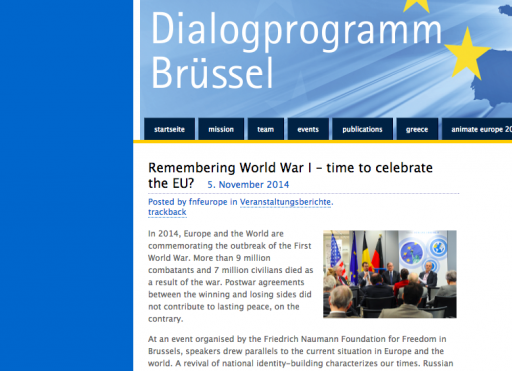‘Overcoming the tragedy- from WW1 to the building of the European Union’ was held on November 4 2014 – and organised by the Friedrich Naumann Foundation for Freedom in Brussels.The organisation has sent Centenary News the following summary of the event, written by Julie Cantalou.
“In 2014, Europe and the World are commemorating the outbreak of the First World War. More than 9 million combatants and 7 million civilians died as a result of the war. Postwar agreements between the winning and losing sides did not contribute to lasting peace, on the contrary.
At an event organised by the Friedrich Naumann Foundation for Freedom in Brussels, speakers drew parallels to the current situation in Europe and the world. A revival of national identity-building characterizes our times. Russian ethnic nationalism combined with expansionism, Hungarian nationalism and crack down on basic freedoms, as well as a general rise of nationalist and populist parties across Europe are just a few of trends observed. Jozo Radoš MEP from Croatia, member of the Committee on Foreign Affairs, remarked that “it is much easier to build national identities than to build a European one”. He pointed out that commemorations have mostly taken place at national level – little being organised at EU level.
However, the EU has a huge potential as a model for conflict resolution. Ambassador J.D. Bindenagel (ret), Henry Kissinger Professor for Governance and International Security at the University of Bonn, mentioned several examples of how the EU could serve as such a model, such as in South East Asia. According to him, diplomacy has a huge role to play in conflict resolution. In the run up to World War I, diplomacy was basically eliminated as a means to solve disputes. He also drew a parallel to Vladimir Putin’s policy of confrontation, who is turning away from the soft power used since the fall of the Berlin Wall 25 years ago.
However, a good diplomacy has to be backed by a serious military force. Ambassador Bindenagel referred to the calls by the US and several European member states to increase the military response capacity of the EU and its member states. He also drew the attention to the lacking reconciliation processes around the world and how these could create potential future conflicts.
Ambassador Dr. Eckart Cuntz, Ambassador of the Federal Republic of Germany to the Kingdom of Belgium, drew on his experience in Belgium to highlight the importance of commemorating an event that happened a century ago: “it is not only a commemoration of the war, but also of reconciliation”. Indeed, until only a few years ago, annual commemorations in Belgium did not include the former German enemy, but now this has changed. Common commemorations and necessary recognitions of guilt have made it possible to “come a bit further in reconciling with our history”, according to Ambassador Cuntz. And “history has given Europe a special responsibility” in striving for peaceful conflict resolution and reconciliation. The big challenge will be to overcome internal disagreements and find a common response to global threats.”
The original event coverage is available here.
Source: Friedrich-Naumann-Stiftung für die Freiheit
Posted by: Ellen Tranter
